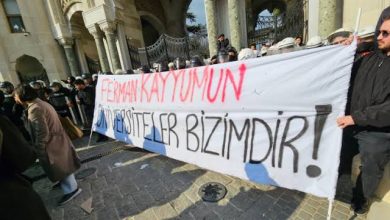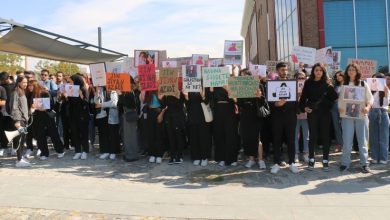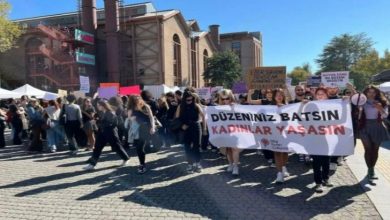Doğukan Akan
Click to read in Kurdish or Turkish.
While this is the reality of the provinces, something is wrong with the wheel. On January 12, a voice shouts in the squares: “Enes Kara is our honor!” The other follows “Revolt… Revolt out of spite!” “Boğaziçi belongs to students!”
“According to the statement made on November 25, 2021, there are 349 dormitories belonging to 49 foundations and 592 private dormitories in Turkey. On the other hand, the number of state dormitories decreased by 20 in the last two years from 793 to 773. Therefore, while there are 3 million 801 thousand 204 university students as of 2021, the dormitory capacity of the Credit and Dormitories Institution (KYK) was limited to only 695 thousand 834.”
In my first year at the university in Kayseri, I started to stay in a private dormitory because I could not get the quota for the KYK dormitory. Although the fee for the private dormitory was too high, they were serving the same meals every two days.
Of course, the management’s favorite food was potatoes: mashed potatoes, potato soup, potato peas, boiled potatoes, baked potato dinner, potato dinner on the stove, etc. Finally, I couldn’t take it anymore and rented a house that cost almost the same amount.
Unemployment, homeless people and leaving Kayseri
First, I got a job for 8 TL per hour to pay my rent. Unfortunately, like many other provincial cities, Kayseri did not treat its students well. The so-called part-time jobs that a student could apply for required working 8 hours a day, six days a week, for 12-13 Turkish liras per hour. I wanted to attend my classes; thus, I had to accept working for 8 Turkish liras per hour, which is half the minimum wage. Along with the new year’s increase in the minimum wage, I also wanted an increase in my salary, which was denied. As a result, I became out of a job while school continued.
Then I became homeless. Since we couldn’t agree with the landlord, I vacated my flat and looked for places to stay for a while. First, I stayed in the city’s cemevi guesthouse for days, then at one of my friend’s parents’ place. Then, when I accepted that I would find neither a student looking for a house nor someone with a spare room in the middle of the semester, I left Kayseri, the city where my school is located, and moved to Ankara to my friends’ house.
As a result of being homeless for months, I dried up my credit card limit, which I issued while working for a job years ago, the advances of my KYK scholarship, and all the resources I could think of. Today, I still pay off my debts from those days. Maybe I was compelled by an invisible hand, if not directly by someone.
The province, family, state, congregation and bourgeois
Although I start the article with my own experience as an Unsheltered (a term used by the movement of We Can’t Find Shelter), I will talk about a story that is not very different. Because when I was talking about my experiences at a provincial university, in a place that is invisible most of the time, I wanted to point out that I sat at the same desks, ate in the same cafeteria, and was a child of the same class.
On December 12, 2021, 90 students who said, “We can’t find shelter,” were detained. On January 11, 2022, Enes Kara was killed.
While all this was going on, someone shouted: “Are we going to close the congregations because a brat died?” Then thousands of my friends answered: “Enes Kara is our honor.”
The calculation of this order for us is pretty simple. Either you put aside quality education and try to survive, or get into debt with money you can’t even imagine, or surrender yourself to reactionism, the supposedly sheltered webs weaved by reactionism by stealing from us. But, of course, most of us were born into those webs. Some of us did not even dream of freedom, and there was no one to teach us how to imagine, either. Some of us believed in the impossibility of freedom; in fact, we were made to believe it. Some people give us despair; they have the same faces as those who weaved the web.
On the one hand, the big cities are a swamp in a sense. People’s labor is exploited; Old weapons and conservative policies are applied against the risk of the rebellion of the exploited people.
This cycle in which congregations and their gateways, foundations feed on what is stolen from the public repeats itself in the family and is passed on from parents to their children. Religious education is imposed on children in public schools and institutions that are extensions of the congregations, which families see as the main “gate of knowledge.”
Children are compelled to attend infants’ school (an unofficial primary school that gives religious education) at the age of five and madrasah education at the age of ten. If they do not stay in a congregation dormitory, these children are obliged to work in domestic and farm work. Especially during the distance education period, tens of thousands of children have been completely cut off from education by the state-congregation-bourgeoisie. While the number of children staying in a congregation and foundation dormitory is unknown, the most “reliable and official” data on child labor is TUIK’s from 2019, before the pandemic. According to these data, there are 720 thousand child workers in Turkey. In vocational high schools, tens of thousands of children are forced to work under “education, internship.”
While reactionary groups use the uneducated people as a vote depot, the continuation of bourgeois exploitation is ensured by the doctrine of gratitude, which is often admonished by the congregations. The education and mentality of children are designed to guarantee the continuation of exploitation in similarly lucrative ways. In short, with these seemingly disconnected but intertwined cycles, the youth, and the people are condemned to poverty and reaction. While all the paths to freedom are blocked, the state-community-bourgeoisie continues to profit.
The realities of province and the voices at the square
Enes Kara was born in such an order. He was raised in this order. In the provinces, families are poor; children are under pressure; congregations are as rich and powerful as can be. If they cannot find a quote in a state-owned dormitory, a young person who has won the university passes through the doors of private dormitories at an extravagant price and takes refuge in a congregation-owned dormitory. After all, it is the first choice of families. On the other hand, renting a house is impossible under the current rental income gap and an option that families do not allow, especially for women. While state dormitories are inadequate and neglected, foundation dormitories receive allowances per student from the state. So the oppression mechanism knows how to make a profit by all means.
While all this is a few minutes of reading for some of us; For thousands of children, young people, and our friends, it is life itself: girls who were cut off from school, young people who could not stand the pressure and committed suicide, primary school students who “skip” the last lesson and worked in the fields…
While this is the reality of the provinces, something is wrong with the wheel. On January 12, a voice shouts in the squares: “Enes Kara is our honor!” The other follows “Revolt… Revolt out of spite!” “Boğaziçi belongs to students!” “Verşan Kök cannot be the rector of METU!”
Students resist the prices of cafeterias and public transportation fees in the dormitories against reactionism. The young people stand up against those who say there is no salvation, those who make us say grace, and those who try to teach us what destiny is, create opportunities to fight, and draw a path for themselves. This path will cover the whole countryside in time; the squares’ voices will expand to the entire country. Because we are all realizing one by one: there is salvation, and that salvation is not far away. Not in the assembly of a few men in suits, it is sitting right next to us, in the same row.
Enes Kara is our honor!
Photo: Sedat Suna



